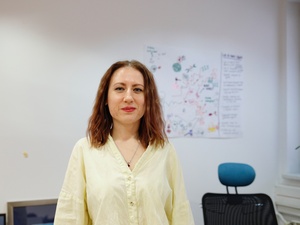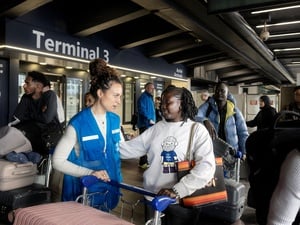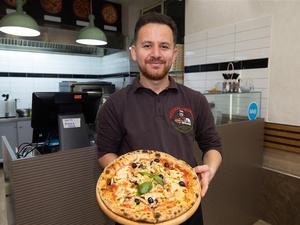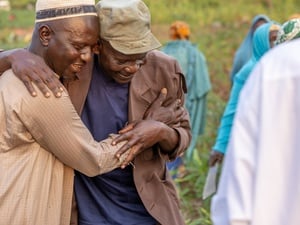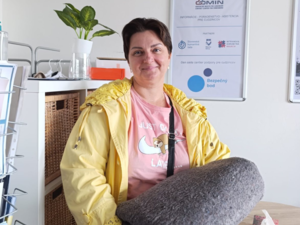Ukrainian refugee reaches new heights with a job in Slovenian forestry
Ukrainian refugee reaches new heights with a job in Slovenian forestry

Hanna works in a small office behind a computer but through her open window she can hear birdsong, smell the tang of pine trees and sometimes even see a deer.
Away from the grinding war in Ukraine, Hanna has found not only safety but a job that matches her skills as a data analyst for Slovenia’s state Forestry Institute. “It’s perfect for me,” she says, looking out at the green view.
Hanna’s story is one of success and shows how crucial employment is to a refugee’s chance of integrating into a new society.
More than three years after the full-scale invasion of Ukraine – and with no end in sight – UNHCR is working with governments and the private sector to support refugees in their search for jobs, adopting a lasting commitment to creating inclusive opportunities for meaningful employment. In Slovenia, close to 10,000 Ukrainians have applied for and were granted temporary protection.
With protection status, Ukrainian refugees in Slovenia, as in the rest of the EU, are allowed to work from day one. But it would help them further if bylaws were changed to recognise their diplomas from back home. Refugees’ own initiative, such as actively seeking opportunities, learning the local language, or pursuing retraining, also plays a crucial role in their integration into the labour market.
"Finding work isn’t always easy,” said Oleg Rogoza, a Senior Protection Assistant for UNHCR in Slovenia. “Many refugees feel frustrated taking jobs below their qualifications, especially when their diplomas aren’t recognized, or language skills hold them back. But even starting small can lead to big changes. Working helps improve language skills, build confidence, and gain local experience—it’s a step closer to inclusion.
UNHCR is working with key stakeholders to simplify qualification recognition and support access to jobs that match refugees’ skills and experience, helping them to more fully contribute to their new communities.
A mixture of luck, hard work and determination brought Hanna Chernyshova, 37, on a journey of many steps from eastern Ukraine to Slovenia, and a job where she is now valued both for her academic background and advanced data skills.
“I couldn’t stay in Ukraine mentally,” she says. “I was searching for a chance to have some bright days in my life.”
Hanna grew up in Makiivka in Donetsk region. As a child, she loved biology. Her parents encouraged her to study medicine and after qualifying, she worked for five years as a paediatrician in the city of Donetsk.
“But I didn’t like it,” she says. “I prefer plants.”
When pro-Russian forces took over the region in 2014, Hanna moved to Kharkiv, Ukraine’s second city. Here she rediscovered her teenage passion for biology, gaining a Master’s degree in the subject.
“But I needed to survive financially,” she says. “I also did all sorts of tech jobs – quality assurance, testing, programming – for private companies.”
Without realising it, Hanna was adding to a portfolio that would make her a desirable candidate for a job in Slovenia, a small Alpine nation bordering Austria and one of Europe’s greenest countries.

Full-scale war broke out in Ukraine in February 2022. Hearing the first explosions in Kharkiv, Hanna wasted no time but packed up and moved with a few belongings and her cat Koshka to Lviv in western Ukraine. But that still didn’t feel very safe. From Lviv, via Poland, she and Koshka went to Slovenia, arriving in August 2022.
Hanna, a keen rock climber, didn’t know much about Slovenia but she was attracted to its wooded mountains.
Initially, she lived in a room in a shared accommodation, although now she rents a whole apartment. After consulting UNHCR’s partner PIC (Legal Center for the Protection of Human Rights and the Environment) to explore legal and technical questions on employment in Slovenia, Hanna was able to earn something by working remotely for a Ukrainian company.
But then in 2023, she spotted a job advertised at the Slovenian Forestry Institute and applied for it.
“We saw Hanna’s CV and took her on merit,” said Gal Kušar, head of the institute’s Department of Forest and Landscape Planning and Monitoring. “We are keeping a national forest inventory, and this is where Hanna’s data skills come in. She is very persistent. If she sees inconsistencies, she’s digging until she finds a solution. Thanks to her, our database is now much more reliable.”

Down a long corridor lined with displays of wood, forest paraphernalia and a stuffed fox, Hanna comes to her office. On the wall is a map of Slovenia with regularly monitored forest plots marked out with pins.
“Sixty per cent of Slovenia is covered with forest,” says Hanna. “Our teams go out to measure the diameters of trees; see how they are growing and how healthy they are. I mostly manage the data, although sometimes I go out into the field too. When you see the trees behind the statistics, it becomes really interesting.”
All of Hanna’s skills have come together in this job. “I had the right combination of biology and tech, so I knew the basics and it was enough to get me started,” she says. “I hope to stay; I never apply for a job if I don’t see myself in it in future.”
English is the lingua franca of the scientific community, but Hanna’s Slovenian is also improving, partly thanks to work, but also because of outings with a local rock-climbing club.
In her lunch breaks at work, Hanna walks through the leafy grounds of the Forestry Institute to a small pink church at the top of Rožnik Hill. But at weekends, she goes with her new Slovenian climbing friends up into the high Alps. “When I walk in the mountains, I feel alive,” she says.“ My brightest emotions are there.




